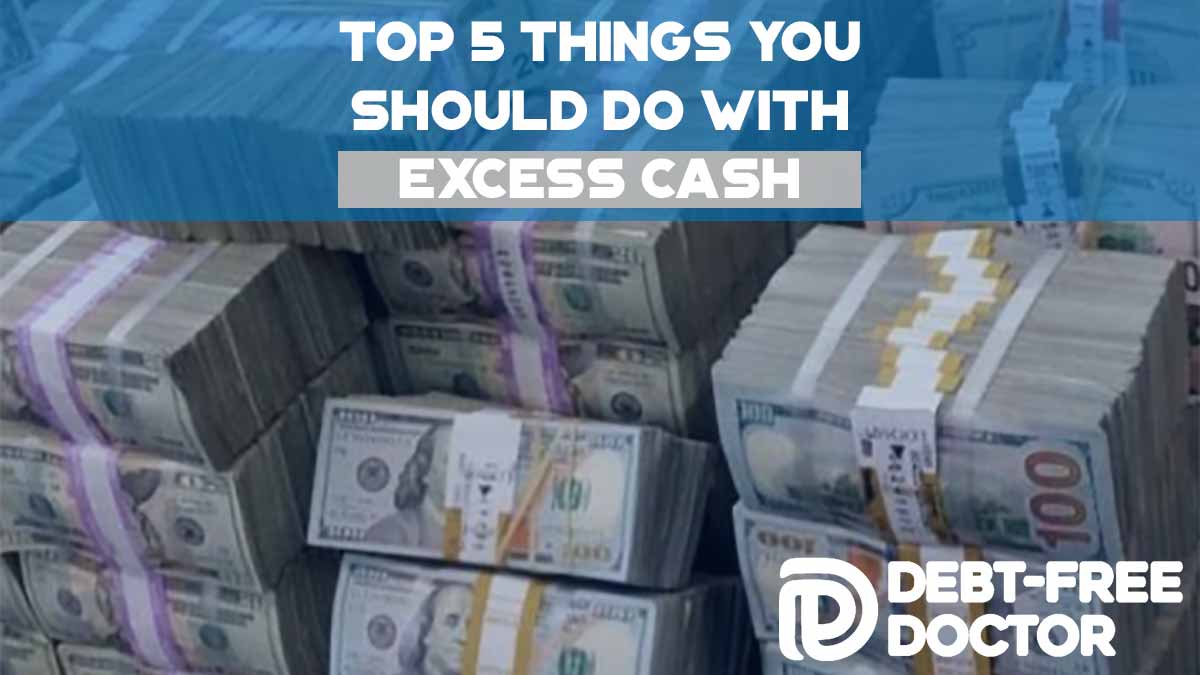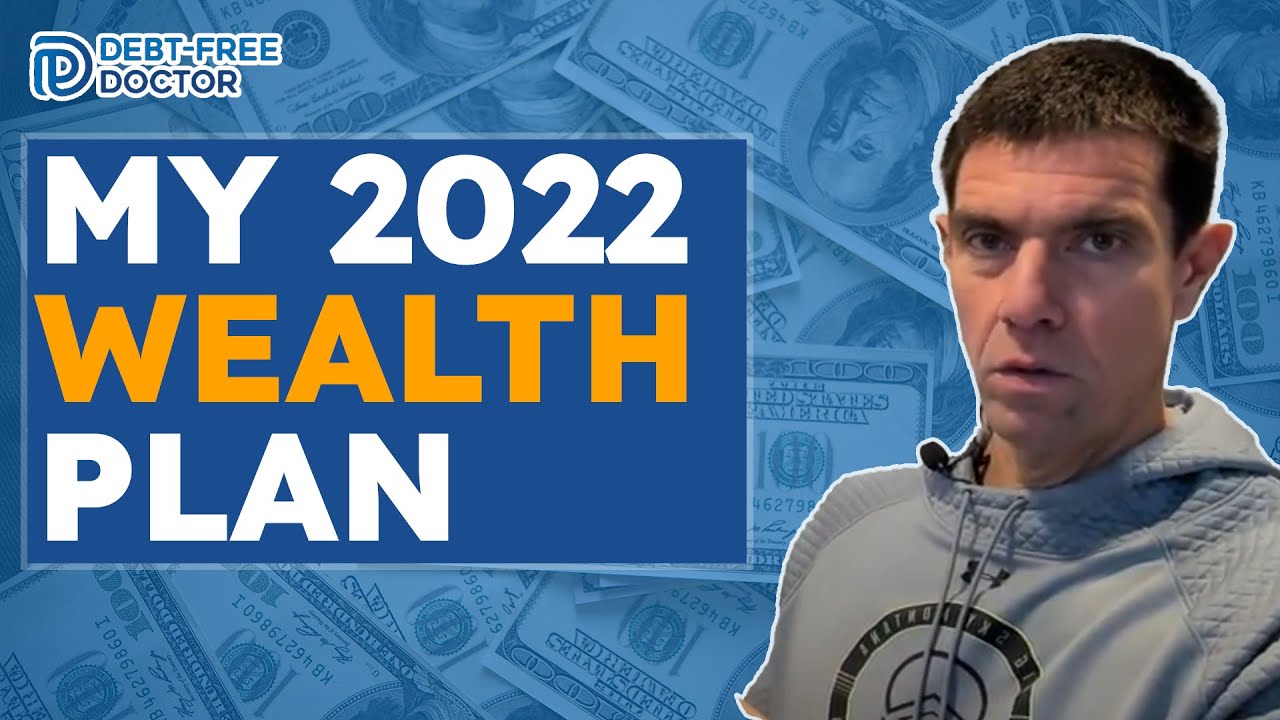“Hey Jeff, I’ve got an extra $300K in surplus cash parked in a savings account earning zero interest, what should I do with it?”
It’s not uncommon to receive questions like this each month. This stems from people spending less during the pandemic plus depositing the excessive “stimulus” checks that’s been handed out like M&M’s (my favorite candy 🙂 ).
This has led many folks to be sitting on a “larger” than normal pile of cash.
If this is something that you’re dealing with then congratulations. It’s a good problem to have!
When it comes to financial planning and security, it’s nice to know you have adequate cash reserves on the sidelines that can be tapped into if needed.
But there’s also a downside to stockpiling all of this cash.
It can severely lower your overall portfolio which has caused many people to ask themselves, “What should I do with this extra cash?”
Don’t Miss Any Updates. Each week I’ll send you advice on how to reach financial independence with passive income from real estate.
Sign up for my newsletterStart With “Why”
One of the first questions you should ask yourself is, “Why do I have these extra funds in the first place?”
First off, make sure that you haven’t started missing payments that were originally scheduled on autopay.
I’ve had something like this happen after we changed credit cards. The email to “update our payment” information obviously slipped through the cracks therefore the service went unpaid for several months before realizing it.
In a situation like this, you may be missing something as opposed to truly having “extra” cash.
If you need help regarding the “why” behind your cash surplus, ask yourself:
- Has my income level changed significantly?
- Even though I have excess money, is my debt increasing due to high interest rates?
- Are payments no longer being charged that were previously being made?
If after answering these questions you realize that yes, you do have a true cash surplus, then it’s time to figure out what to do with it.
Let’s get going….
Why Not Hold Cash?
Let’s begin our journey addressing the downside of having too much dry powder sitting on the sidelines…opportunity cost.
For example, you’re not going to want to look back 10 years from now and regret not investing that extra dough.
Let’s say you had an extra $100,000 in a money market account that ten years ago you wished you’d invested it in an index fund averaging 7%.
In this scenario, your original investment would have grown to $196,000.
In other words, that averages out to $1,633 a month in missed opportunity.
Even though we’re assuming a 7% rate of return, the market can return much higher returns but there’s also times where it’s lower than 7% as well.
But don’t let that short-term uncertainty of returns keep you from investing extra cash that you’re not going to need anytime soon.
How Should I Use My Cash Surplus?
#1 Add to emergency fund
Before trying to figure out what to do with all of that extra cash, make sure it’s where it should be in the first place.
Most financial experts recommend keeping between 3-6 months of living expenses in emergency savings. This account is strictly for when life throws you a curveball (transmission goes out or HVAC stops working in the summer).
How much you have sitting in the bank depends on your financial situation and risk tolerance.
If you’re in a two income household then you may be able to get by with 3 months of savings versus 6 months with a one income household.
Also, practice or business owners like myself may want to consider keeping enough money on hand for future cash flow and peace of mind.
#2 Get rid of consumer debt
One of the best uses for extra money could be getting rid of any excess consumer debt hanging around your neck. Especially high-interest debt.
This could include high-interest debt such as credit card debt or vehicle loans. Some credit cards can have rates over 20% so why have that hanging over your head with extra cash in the bank?
Higher rates make your debt more expensive, and you’ll end up paying more over the long run. So the longer those balances sit and earn interest, the more you’ll pay.
As a periodontist, I know firsthand about debt, especially student loans. I completed training with $300,000 of debt that I aggressively paid off in just under seven years.
If you have student loans with high interest rates, you may want to consider using extra cash to pay them off loans too.
#3 Max out retirement accounts
According to the US Bureau of Labor Statistics, only 55% (out of 71%) of workers that have access to an employer-sponsored retirement account actually invest in them.
If you’re trying to decide the best strategy to use with extra cash each month, then consider maxing your retirement account (especially if your employer offers a match).
For instance, if you make $50K/year and contribute 3% of your salary (or $1,500) while your employer offers a 3% match, then they’ll also kick in $1,500. Why not take advantage of free money, right?
If you’re interested on how I handle not only my extra cash but all of my available cash, check out this video:
#4 Save for kids’ college
Proverbs 13:22: “A good man leaves an inheritance to his children’s children.”
No matter your kid’s ages, it’s never too early to start saving for college.
The earlier you start, the more time that money will grow via compound interest.
The best way (in my opinion) to save for college is a 529 plan, which I’ve used for both of our kids’ college.
These plans are generally sponsored by state governments and come with tax benefits. Many states let you deduct your contributions from your state tax income as well for an added benefit.
My Recommendation
The above four ways are what a typical financial planner recommend you do with excess cash.
Now there’s nothing wrong with:
- a fully funded emergency fund
- becoming consumer debt-free
- maxing out retirement accounts
- saving for kids’ college
This is what we’ve done in the past but what about if you’ve completed all of these yet still find yourself with excess cash?
Let me introduce you to the “Future Opportunity Fund“.
Start a Future Opportunity Fund
For me personally, one of the best uses for excess cash was starting a Future Opportunity Fund.
This is nothing more than establishing a brokerage account (i.e. Vanguard) to fund just about anything you want.
It’s allowed my wife and I to change our money mindset and is also helping us reach our financial goals.
Do you want to know why it’s a good idea? What do most people invest in regarding retirement?
Retirement savings right?
What if you don’t want to wait until you’re 59 ½ years old to use it?
What if you’re like the hundreds of thousands of high-income professionals that are facing burn out and want a career change? Or want to retire early?
Related article: Escape The Rat Race: What School Failed To Teach You About Money
What if you’re in your 30’s or 40’s and a few years in the future you want to:
- start a new business
- buy a rental property
- invest in assets with a higher rate of return via passive income
These are all examples of how you can use a Future Opportunity Fund.
After we take care of the initial steps in our investment strategy each month (see video above), we then can focus on funding our Future Opportunity Fund.
I mainly use the money for:
- passive income creation via syndications
- self-improvement (masterminds, coaching, etc.)
- Bitcoin and other cryptocurrency
- future business opportunities
The good news about starting this type of fund is that you don’t initially need a goal in mind.
You can follow as I do and add to it until the right opportunity presents itself. And when that time comes, you’ll have the appropriate funding available.
Join the Passive Investors Circle


